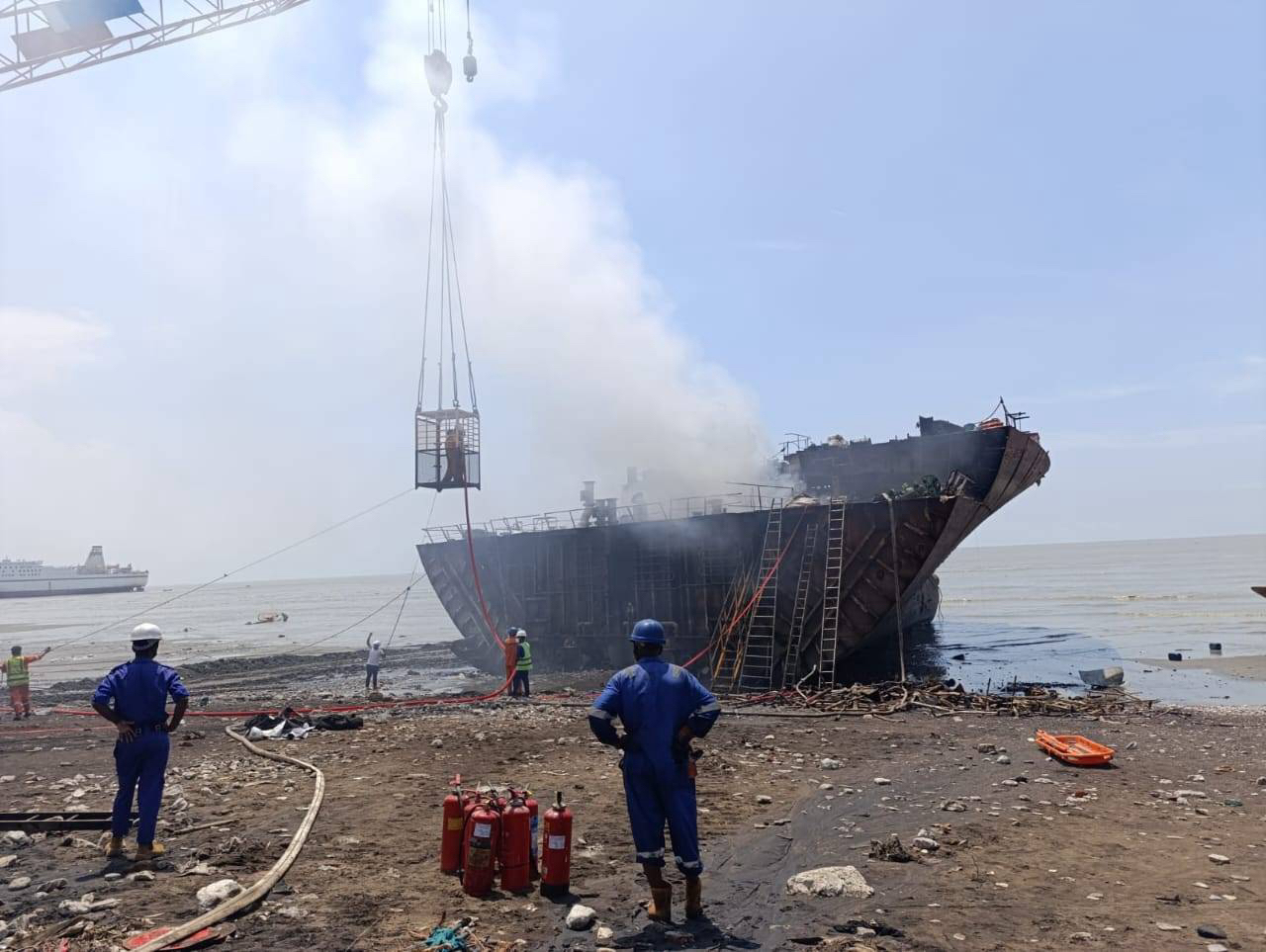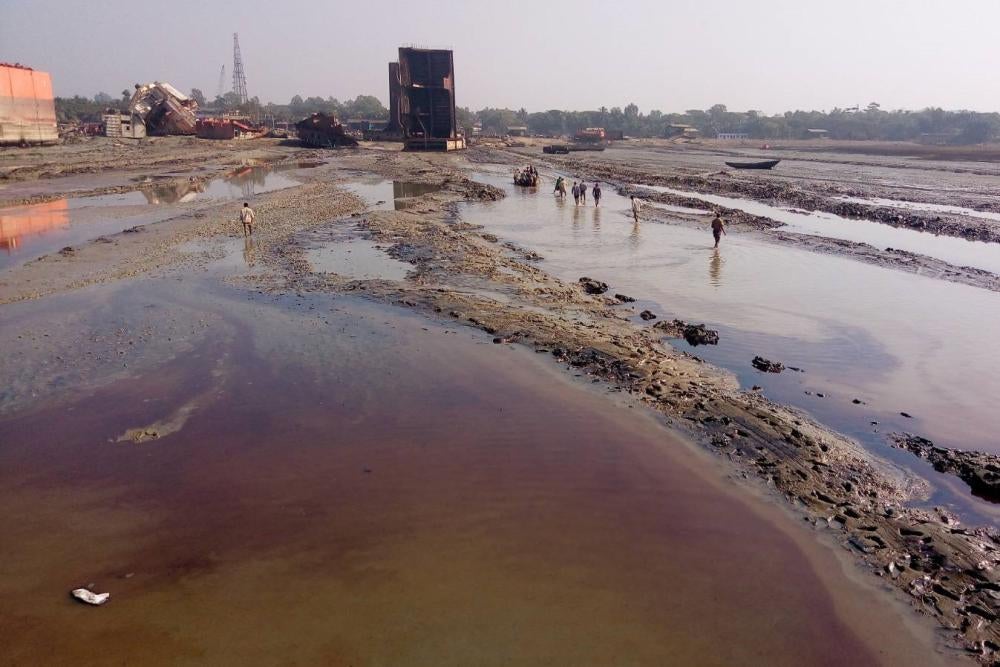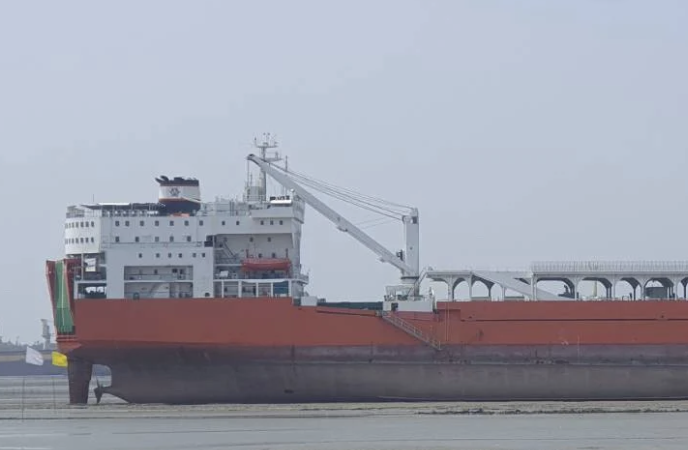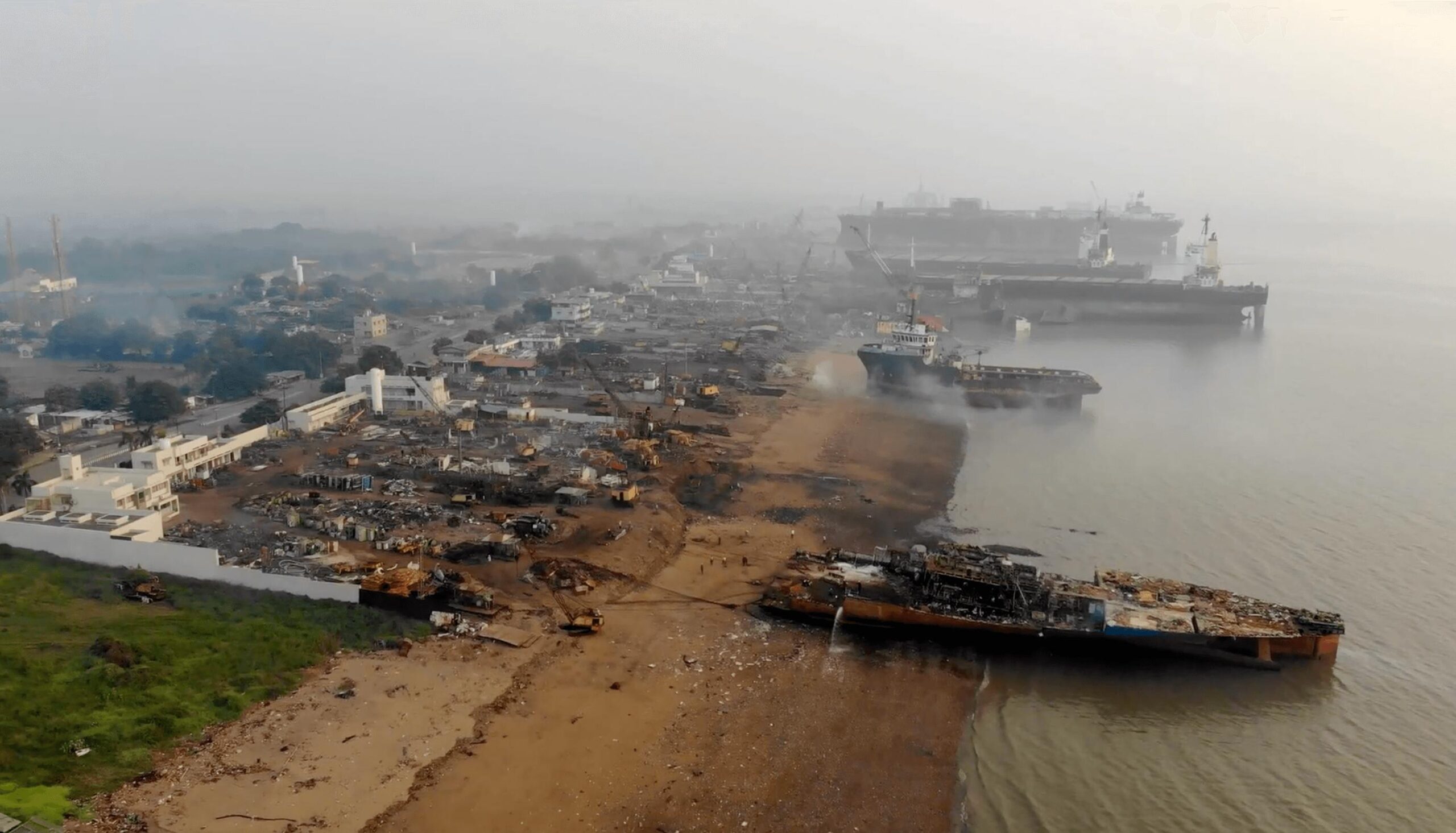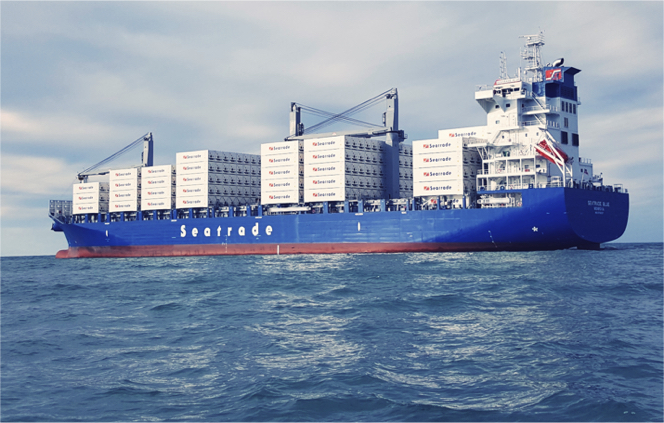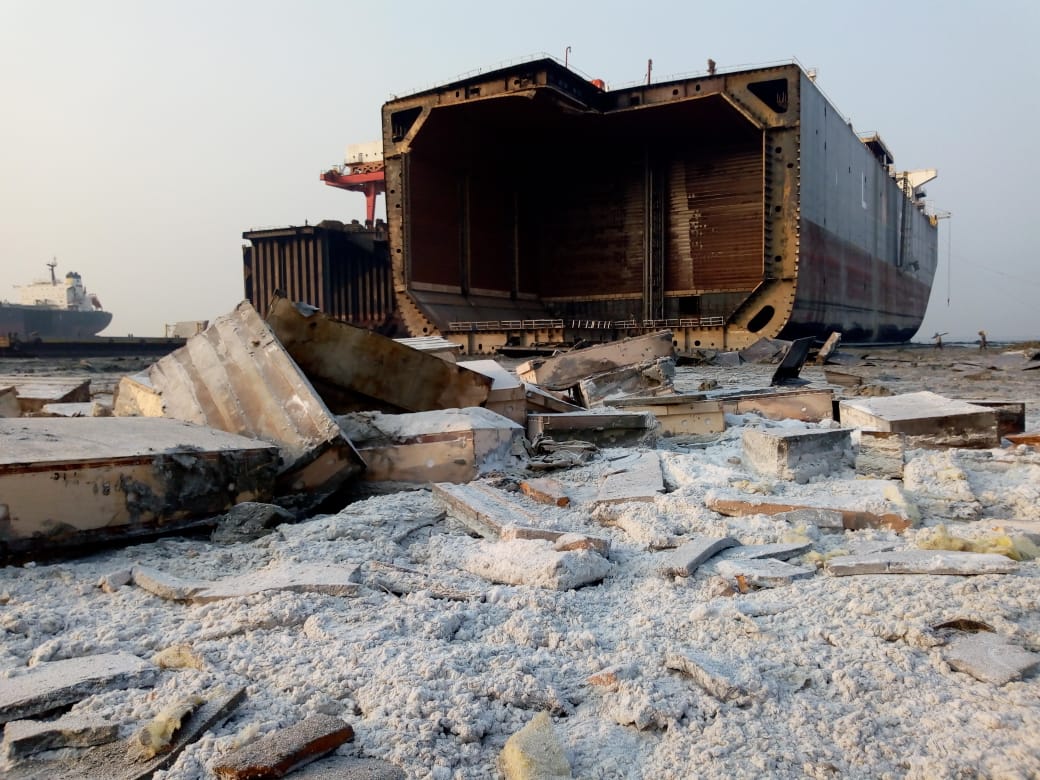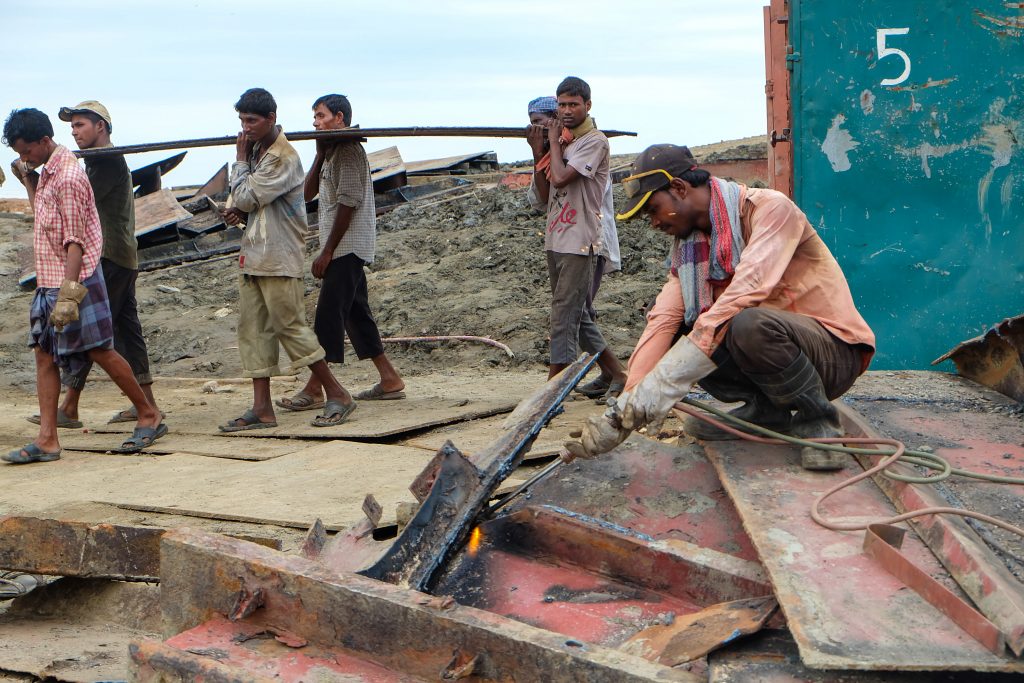Deadly accident in a yard with Hong Kong Convention certification
The explosion on the oil tanker MT Suvarna Swarajya on September 7, 2024, in Bangladesh underscores the lack of adequate international and national regulations, oversight, and labor rights protections in the shipbreaking industry, Human Rights Watch and the NGO Shipbreaking Platform said today. Six workers have died and four remain in critical condition.
Shipowners frequently use a network of middlemen and loopholes to circumvent international regulations that prohibit the export of ships to dismantling facilities in Bangladesh that do not have adequate environmental or labor protections. The MT Suvarna Swarajya was previously owned by the Shipping Corporation of India, then sold in March 2023 to Last Voyage DMCC, a subsidiary of Best Oasis, one of the world’s largest cash buyers of ships. Last Voyage DMCC then sold it in May to S.N. Corporation in Bangladesh for dismantling, despite the company’s poor health and safety record, with at least 14 deaths and 22 injuries since 2010 and before the sale.


The explosion occurred in the Unit-2 yard of S.N. Corporation, a few months after Nippon Kaiji Kyokai certified the Unit 2 yard under the requirements of the International Maritime Organization’s (IMO) Hong Kong International Convention for the Safe and Environmentally Sound Recycling of Ships. While the Convention will enter into force June 26, 2025, many shipbreaking yards are seeking voluntary certification using Hong Kong Convention standards.
Human Rights Watch, the NGO Shipbreaking Platform, and other rights and environmental organizations have repeatedly raised concerns that the Convention provides for weak environmental and safety standards.
Human Rights Watch wrote to S.N. Corporation, Best Oasis, the Shipping Corporation of India, and Nippon Kaiji Kyokai about the September 7 explosion. Nippon Kaiji Kyokai responded on September 15 confirming that the company had conducted their audit based on IMO guidelines. S.N. Corporation, Best Oasis, and the Shipping Corporation of India have not responded.
Countries at the International Maritime Organization’s Marine Environment Protection Committee meeting on September 30, including Bangladesh, should establish clear consensus that the Hong Kong Convention does not replace the Basel Convention on the Control of Transboundary Movements of Hazardous Wastes and Their Disposal, which applies to end-of-life ships, and offers a higher level of control, the organizations said.
Following the explosion, Bangladesh authorities have indefinitely shut down S.N. Corporation’s yard where the explosion occurred, halted all work on the MT Suvarna Swarajya, and opened an official investigation into the accident. The Department of Environment has suspended the yard’s environmental clearance and ordered SN Corporation to report within three days why the yard should not be permanently shut down.
According to data collected by the NGO Shipbreaking Platform, among the casualties in yards owned by SN Corporation since 2010, six injuries occurred earlier in 2024 across its three yards. Two of them were on the MT Suvarna Swarajya in May, when a falling pipe broke one worker’s leg and a steel rope injured another worker’s hand. In 2021, one worker in an S.N. Corporation yard died when he fell from a ship during a cutting operation. In 2020, another worker died, also in an S.N. Corporation yard, when he was hit by a falling metal cable.
Workers from S.N. Corporation’s yards told Human Rights Watch in July 2022 that the conditions at those yards were dangerous. A 27-year-old cutter said: “I face risk every day that I work in the shipbreaking yard. Nobody wants to work here because they know there is a risk and accidents may occur at every step. The owners do not provide us with any safety measures. They overlook these things.” He said that while the yard’s management provided him with a helmet and gloves, he paid for his own boots, goggles, and protective clothing, despite earning less than US$1.50 per hour, well below Bangladesh’s minimum wage for shipbreaking workers.
While the Bangladesh interim government has taken positive steps to address S.N. Corporation’s alleged failure to ensure worker safety, international corporations that enabled the MT Suvarna Swarajya to be dismantled under alleged unsafe conditions should also be held accountable, the groups said. At a minimum, if found responsible, the companies involved, including S.N. Corporation, Best Oasis, and the Shipping Corporation of India, should pay for the medical treatment, long-term rehabilitation, and compensation to those injured, and provide compensation for workers who were killed. In response to questions about measures they are taking to provide compensation, the companies did not respond.
Cash buyers like Best Oasis serve as scrap dealers for end-of-life ships. The use of cash buyers has the effect of shielding ships’ original owners and operators from accountability for deaths and injuries taking apart their ships. Given that the three main cash buyers, including Best Oasis, sell ships almost exclusively to yards in South Asia where labor rights abuses and environmental harms have been well-documented, it is reasonable to expect that shipping companies that sell end-of-life ships through cash buyers know that their ship will likely be scrapped under abusive and environmentally damaging conditions.
Many cash buyers typically use shell companies or ship registries with lower regulatory burdens as part of their final voyage package, to further obfuscate the beneficial owner of the ship before it is sold to a shipbreaking yard with minimal environmental and safety requirements.
Many shipping companies, including some of those based in Europe and North America, use cash buyers to circumvent international and regional regulations that ban dumping their ships in subpar yards to increase their profit.
In 2019 the Bangladesh High Court ordered that vessels sailing under flags that have been gray- and black-listed for persistent violations by port state controls, should not be allowed to be imported into Bangladesh. However, more than 100 end-of-life ships were imported under gray- and black-listed flags last year to Bangladesh, in violation of the High Court order.
To be imported to Bangladesh for breaking, a ship must be issued a “No Objection Certificate” from the Bangladesh Ship Recycling Board, indicating that there are no hazardous materials onboard. The Department of Environment must also issue an environmental clearance certificate, and the Department of Explosives must issue “gas free for man entry,” and “gas free for hot work” certificates.
In a 2023 report, Human Rights Watch viewed 21 leaked hazardous waste certificates for ships entering Bangladesh to be dismantled. The language was consistently pro forma and, in some cases, verbatim, suggesting that the parties drafting the certificates were not conducting adequate inspections of the actual materials onboard the ships. This apparent lack of genuine inspection and oversight exponentially increases the risk of accidents like the explosion on the MT Suvarna Swarajya, the groups said.
Bangladesh’s interim government should enforce the 2009 High Court orders that halted the import of ships for recycling until there were “satisfactory provisions for the safety of the workers,” and properly enforce the High Court’s 18-point directive and subsequent orders that require rigorous health and safety standards and labor rights and environmental protections, including the ban on importing ships under gray- and black-listed flags.
The Ministry of Industries should immediately shut down any shipbreaking yards employing children, and any yards found to have night operations or are otherwise seriously violating workers’ rights. The Ministry should set a timebound directive to yards to move all ship recycling operations off the beach because dismantling ships on the sand is inherently more dangerous for workers and environmentally damaging. The worksite itself is full of hazards and it is impossible for emergency vehicles to traverse the sandy beach to access the job sites in case of injuries or fire. Shipbreaking yards in Bangladesh should install proper industrial platforms in accordance with the Basel Convention Technical Guidelines on Ship Recycling.
In line with the UN Guiding Principles on Business and Human Rights, if not already in place, shipping companies should adopt formal and explicit due diligence policies that ensure the company maintains oversight of where ships are recycled and ensures that ships, including those previously owned or operated by the company, are not discarded in yards that use the beaching method. Given the loopholes and the urgent need for stronger regulation of ship recycling, Human Rights Watch and the NGO Shipbreaking Platform believe that adequate voluntary due diligence by shipping companies requires stopping all sales through cash buyers.

To read the report, “Trading Lives for Profit: How the Shipping Industry Circumvents Regulations to Scrap Toxic Ships on Bangladesh’s Beaches,” please visit:
https://www.hrw.org/node/385988
For more Human Rights Watch reporting on Bangladesh, please visit:
https://www.hrw.org/asia/bangladesh
For more Human Rights Watch reporting on health and human rights, please visit:
https://www.hrw.org/topic/health
CONTACT
For Human Rights Watch, in New York, Julia Bleckner (English): +1-917-890-4195 (mobile); or blecknj@hrw.org.
For NGO Shipbreaking Platform, in Brussels, Ingvild Jenssen (English, French, Norwegian): +32-485-190-920 (mobile); or ingvild@shipbreakingplatform.org.
For Human Rights Watch, in London, Meenakshi Ganguly (English, Bengali, Hindi): +91-9820-036-032 (mobile); or gangulm@hrw.org. Twitter: @mg2411

